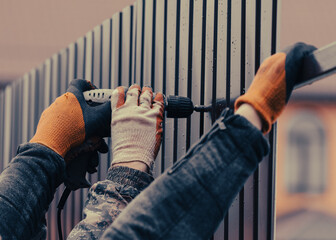A fence is more than just a boundary—it adds security, privacy, and aesthetic appeal to any property. From residential yards to commercial spaces, a properly installed fence defines spaces, protects assets, and enhances overall value. Understanding the types of fences, installation methods, maintenance practices, and benefits ensures a durable, attractive, and functional addition to any property.

The Importance of a Fence
Fences serve multiple purposes, making them a worthwhile investment for homeowners and business owners alike. Some key benefits include:
- Security – Fences act as a barrier against intruders, keeping children, pets, and property safe.
- Privacy – A well-designed fence shields outdoor spaces from neighbors or passersby, creating a personal sanctuary.
- Property definition – Fences clearly mark boundaries, reducing disputes and guiding landscaping and construction projects.
- Aesthetics – Fences enhance the visual appeal of a property, complementing landscaping and architectural design.
- Noise reduction – Solid fences can help reduce the impact of traffic or neighborhood noise.
A properly chosen and installed fence combines functionality with visual appeal, providing long-term value and protection.
Common Fence Types
Selecting the right fence depends on property needs, aesthetic preferences, and budget. Common fence types include:
- Wood fences – Offering natural beauty and versatility, wood fences are popular for privacy and decorative purposes. They can be customized with paint or stain, but require regular maintenance to prevent weather damage.
- Vinyl fences – Durable and low-maintenance, vinyl fences resist fading, rot, and pests, making them ideal for long-term use.
- Chain-link fences – Cost-effective and strong, chain-link fences are often used for security or enclosing pets. They provide visibility while maintaining a reliable barrier.
- Metal fences – Aluminum or wrought iron fences offer strength, elegance, and low maintenance, suitable for security and ornamental purposes.
- Composite fences – Made from recycled materials, composite fences combine durability and low upkeep, resisting rot, insects, and weather.
Choosing the right fence involves considering the purpose, climate, maintenance requirements, and visual style desired.
Planning and Preparation
Successful fence installation begins with careful planning:
- Property lines – Confirm boundaries to avoid disputes and comply with local regulations.
- Local regulations and permits – Some areas require permits or have restrictions on fence height, placement, or materials.
- Site assessment – Evaluate terrain, slopes, and obstacles to determine installation techniques.
- Gate placement – Plan convenient access points without compromising security or aesthetics.
- Material selection – Consider durability, maintenance needs, and visual style before purchasing materials.
Proper planning ensures a smooth installation process and a fence that meets functional and aesthetic goals.
Installation Process
Fence installation involves several critical steps:
- Site preparation – Clear vegetation, rocks, and debris to create a level path for the fence.
- Post installation – Posts provide structural support. Holes are dug at regular intervals, and posts are secured with concrete or compacted soil.
- Attaching panels or rails – Fence panels, rails, or mesh are connected to the posts, depending on the fence type.
- Gate installation – Gates are mounted securely with hinges and latches to ensure proper alignment and function.
- Finishing touches – Painting, staining, or sealing wood fences, and trimming or adjusting panels, enhance durability and appearance.
Professional installation guarantees precise alignment, stability, and long-lasting performance.
Maintenance and Longevity
Maintaining a fence prolongs its life and keeps it looking attractive:
- Cleaning – Remove dirt, mold, or mildew with soap and water or pressure washing.
- Inspections – Check for damage, loose posts, rust, or rot, and address issues promptly.
- Painting or staining – Wooden fences benefit from protective coatings that prevent weathering and extend lifespan.
- Gate maintenance – Lubricate hinges and locks to ensure smooth operation.
- Vegetation control – Trim plants near the fence to reduce moisture buildup and prevent damage.
Routine maintenance preserves both the function and appearance of a fence, protecting the investment over time.
Choosing Professional Services
While DIY installation is possible, hiring professionals offers significant advantages:
- Expertise – Professionals ensure accurate post placement, alignment, and stability.
- Specialized tools – Experienced installers use the right equipment for precise installation.
- Time efficiency – Professionals complete projects faster and with minimal disruption.
- Warranty and support – Many services provide guarantees, offering peace of mind.
- Customized solutions – Experts design and install fences tailored to property features and owner preferences.
Professional installation ensures a durable, aesthetically pleasing, and functional fence.
Benefits of a Well-Built Fence
Investing in a quality fence provides numerous advantages:
- Enhanced security – Protects property, pets, and family members.
- Increased property value – Improves curb appeal and overall marketability.
- Privacy – Solid fences create secluded areas for relaxation or entertainment.
- Durability – Properly installed and maintained fences withstand weather, pests, and wear.
- Aesthetic appeal – Complements landscaping and architecture, enhancing the property’s beauty.
A strong, attractive fence offers practical and visual benefits that last for years.
A well-built fence is a valuable addition to any property, combining security, privacy, and aesthetic appeal. Selecting the right materials, planning carefully, and maintaining the fence regularly ensures long-lasting performance and beauty.
Professional installation, coupled with routine care, provides peace of mind while protecting investments and enhancing property value. Whether for privacy, security, or decoration, a quality fence defines property boundaries, improves curb appeal, and creates a safe and enjoyable outdoor environment. Proper planning and maintenance guarantee a functional, attractive, and durable fence that adds lasting value to any property.